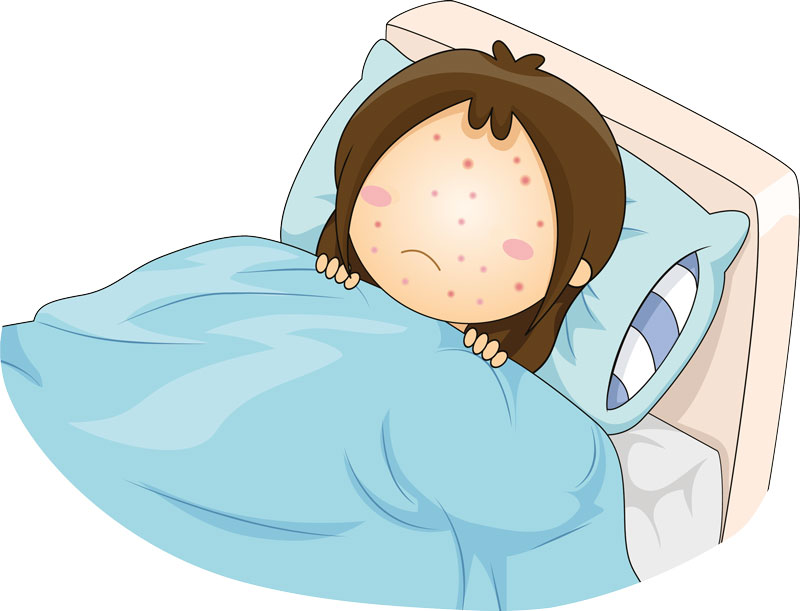Chicken Pox
What is Chicken Pox?
Chicken pox is a viral infection caused by the varicella-zoster virus. Most children have chicken pox at some stage of their lives and the immune system of the body will fight the virus and produce antibodies during the infection. This will provide life-long immunity. The disease is therefore common in children and rare in adults.
How is it spread?
The chicken pox virus spreads through the air via tiny droplets from person to person when the infected person coughs or sneezes. You have a high chance of catching it if:
- You are in the same room as someone with chicken pox for more than 15 minutes
- You have face-face contact with someone with chicken pox (during a conversation)
- You touch surfaces or objects on which the virus droplets landed.
It can take 7-21 days for symptoms to develop. A person with chicken pox is infectious from 2 days before the rash appears and until after the spots have crusted over (generally about 5 days from the initial appearance of the rash)
Symptoms
Some children feel quite unwell for a few days whilst others only have mild symptoms.
Symptoms include:
- Fever, body ache and headache that often start a day or two before the rash appears.
- Rash that appears in small crops and develops into small fluid-filled itchy that can appear anywhere on the body and develop over several days.
- Dry cough and sore throat.
Most children feel better within a week as the blisters dry up, scab and fade, which may take about 2 weeks to clear.
Complications of Chicken Pox
Children
Complications from chicken pox are rare in healthy children although the blisters sometimes become infected with bacteria when they appear red and sore. If this occurs, you should seek advice from your GP who may prescribe antibiotics for the infection.
Adults
In the case of adults, chicken pox can cause more severe complications and the affected individual may need to be admitted to hospital. Approximately one in eight adults may also develop lung infections such as pneumonia. Most people still make a full recovery.
Pregnancy
If you get chicken pox while you are pregnant, there is a small but significant risk to your unborn baby.
If you catch chicken pox during the first 28 weeks of your pregnancy, there is a risk that your unborn baby could develop a condition known as foetal varicella syndrome (FVS); which can cause serious complications including scarring, eye defects such as cataracts, shortened limbs and brain damage.
If you catch chicken pox after the 20th week of pregnancy, there is a possibility that your baby may be born prematurely
If you catch chicken pox a week before or a week after giving birth, your baby may develop a more serious type of chicken pox, which in severe cases can be fatal.
People with a weakened immune system
If your immune system is weak or if you are taking immunosuppressant medication such as steroids, you are more likely to catch chicken pox and develop complications such as pneumonia, septicaemia and meningitis from chicken pox
Please consult your GP urgently if:
- you are pregnant or have given birth in the last 7 days
- you think you may have chicken pox
- you have been exposed to someone who has chicken pox
- you have a weakened immune system and have been exposed to the chicken pox virus
Treatment
There is no specific treatment for chicken pox. Treatment is aimed at relieving the symptoms and includes:
- Reduce the fever-paracetamol may be given. (Ibuprofen should not be given as it may cause adverse skin reactions during chicken pox)
- Drink plenty of fluids (water, light fruit juices and soups) to prevent dehydration
- Apply a soothing cream (emollient) to ease the itchiness-calamine lotion is not recommended as once dry it is no longer effective and may cause discomfort.
- An oral antihistamine may be given to older children and adults to relieve the itchiness
- Trim fingernails short to prevent deep scratching
- Use loose fitting cotton garments or even discarding clothing if practicable to keep the body cool and stop the skin from becoming irritable and sore.
- Refrain from tepid sponging or placing cold fans near children as this may make the symptoms worse.
Preventing the spread of Chicken Pox
Infected persons and their carers should:
- Wash hands thoroughly with soap regularly
- Make sure that all household areas are wiped down regularly with detergent
- Ensure the infected clothing and bed linen is washed frequently
- Keep children off school or nursery for 5-6 days until the spots have crusted over. Always inform the school or nursery if your child has chicken pox
- Avoid travelling on an aeroplane until blisters have dried and scabbed over
For further information, contact the Infection Prevention and Control Department at St Bernard’s Hospital
Telephone: 20072266 Ext 2315
Email: infections@gha.gi


